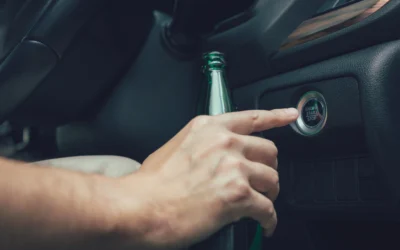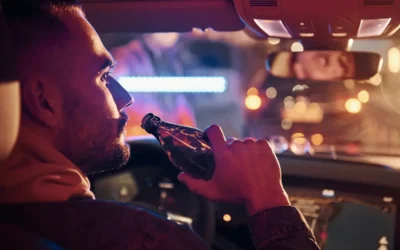When Does a DUI Cross the Line from Misdemeanor to Felony in Nevada?
Getting pulled over and charged with DUI can turn your world upside down in an instant. But what many people don’t realize is that not all DUI charges are created equal in Nevada. The difference between a misdemeanor and felony DUI charge can mean the difference between spending a few days in jail versus years in state prison.
Nevada’s DUI laws are structured to escalate penalties based on several factors, and knowing where your case falls on this spectrum is crucial for your future. Whether you’re facing your first offense or dealing with multiple charges, the classification of your DUI charge will dramatically impact everything from your immediate freedom to your long-term employment prospects.
When is a DUI Considered a Misdemeanor in Nevada?
Most DUI charges in Nevada start as misdemeanors, but this classification comes with specific conditions and limitations that you need to know about.
First DUI Offense
Your first DUI conviction within a seven-year period is typically classified as a misdemeanor under Nevada Revised Statutes (NRS) 484C.400. This applies when no one was injured and you don’t have any prior DUI convictions within the lookback period.
The penalties for a first-offense misdemeanor DUI include:
- Jail time: 2 days to 6 months (often suspended or converted to community service for first-time, non-aggravated offenses)
- Fines: $400 to $1,000 plus court costs
- License suspension: 90 days with possible restricted license after 45 days
- DUI school: Completion required
- Victim impact panel: Attendance mandatory
Second DUI Offense Within Seven Years
A second DUI within seven years remains a misdemeanor but carries increased penalties, including a minimum of 10 days in jail. The court takes repeat offenses seriously, even at the misdemeanor level.
Second offense penalties include:
- Jail time: 10 days to 6 months
- Fines: $750 to $1,000 plus court costs
- License revocation: 1 year
- Ignition interlock device: Required for 12-36 months
- Community service: Up to 200 hours
The seven-year lookback period is crucial here. Nevada uses this timeframe to determine whether a DUI qualifies as a second or subsequent offense. If your previous DUI conviction occurred more than seven years ago, your current charge may still be treated as a first offense for penalty purposes.
When Does a DUI Become a Felony in Nevada?
The line between misdemeanor and felony DUI charges is clearly defined in Nevada law, and crossing it brings severe consequences that extend far beyond typical misdemeanor penalties.
Third DUI Within Seven Years
Under NRS 484C.400, a third DUI offense within seven years automatically becomes a Category B felony. There’s no judicial discretion here – the law mandates felony classification regardless of the circumstances surrounding the current arrest.
Third offense penalties include prison sentences ranging from one to six years and fines between $2,000 and $5,000. The license revocation period extends to three years, and the conviction carries all the long-term consequences of a felony record.
DUI Causing Death or Substantial Bodily Harm
Even a first-time DUI can become a felony if it results in death or substantial bodily harm to another person. Nevada law defines this as a Category B felony under NRS 484C.430.
Nevada defines substantial bodily harm in NRS 0.060 as bodily injury that creates a substantial risk of death, causes serious permanent disfigurement, or results in protracted loss or impairment of bodily function. This can also include prolonged physical pain.
Penalties for DUI causing substantial bodily harm or death include two to 20 years in prison and fines ranging from $2,000 to $5,000.
Vehicular Homicide
When someone with three or more prior DUI convictions causes a death while under the influence, the charge escalates to vehicular homicide under NRS 484C.440, classified as a Category A felony. This represents the most serious DUI-related charge in Nevada, carrying potential sentences of 25 years to life in prison.
What Factors Determine How Your DUI is Charged?
Several key factors influence whether prosecutors file misdemeanor or felony charges in your case:
- Prior Conviction History: Nevada’s seven-year lookback period means any DUI convictions within this timeframe count toward escalating your current charge. The state maintains comprehensive records, so prior convictions in other states may also impact your case.
- Injuries or Deaths: Any accident resulting in substantial bodily harm or death to another person can elevate a DUI to felony status, regardless of your prior record.
- Blood Alcohol Content (BAC): While BAC level doesn’t directly determine misdemeanor versus felony classification, extremely high BAC readings can influence sentencing and may be considered an aggravating factor.
- Circumstances of Arrest: Factors like excessive speeding, reckless driving, or having children in the vehicle can impact how prosecutors approach your case, though they don’t automatically change the misdemeanor/felony classification.
How Do Penalties Compare Between Misdemeanor and Felony DUI?
The difference in consequences between misdemeanor and felony DUI charges is substantial and affects multiple aspects of your life.
Incarceration Differences
Misdemeanor DUI convictions result in county jail sentences measured in days or months. Felony convictions mean state prison time measured in years. This distinction affects not only the length of incarceration but also the conditions and location of confinement.
Financial Impact
Misdemeanor fines typically range from $400 to $1,000, while felony fines start at $2,000 and can reach $5,000 or more. However, the true financial impact extends beyond fines to include court costs, attorney fees, increased insurance rates, and potential job loss.
License Consequences
Misdemeanor DUI convictions generally result in license suspensions of 90 days to one year. Felony convictions trigger longer revocation periods – three years for a third DUI offense and potentially longer for DUI causing injury or death.
Long-term Consequences
Felony convictions carry consequences that extend far beyond the immediate penalties. A felony record can affect:
- Employment opportunities, especially in positions requiring professional licenses
- Housing applications and rental approvals
- Educational opportunities and financial aid eligibility
- Voting rights and firearm ownership
- Immigration status for non-citizens
Nevada’s “Once a Felon” Rule
Nevada implemented what’s known as the “once a felon” rule, which significantly impacts how subsequent DUI offenses are handled. Once you’ve been convicted of a felony DUI, any future DUI conviction – regardless of when it occurs – will be charged as a felony.
This rule eliminates the seven-year lookback period for individuals with prior felony DUI convictions. A person with a felony DUI conviction from 10 years ago who gets arrested for DUI today will face felony charges, not misdemeanor charges.
Available Defenses for DUI Charges
Both misdemeanor and felony DUI charges can be challenged through various legal defenses, though the stakes are considerably higher with felony cases.
Common defense strategies include:
- Challenging the Traffic Stop: Law enforcement must have reasonable suspicion to initiate a traffic stop. If the initial stop was unlawful, evidence obtained afterward may be suppressed.
- Field Sobriety Test Issues: These tests are subjective and can be affected by medical conditions, weather, or improper administration by officers.
- Breathalyzer Accuracy: Breath testing devices require regular calibration and maintenance. Technical problems or operator error can affect results.
- Blood Test Contamination: Blood samples must be properly collected, stored, and tested. Chain of custody issues or laboratory problems can compromise results.
- Medical Conditions: Certain medical conditions can affect BAC readings or mimic signs of impairment.
The complexity of felony DUI cases often requires more extensive investigation and preparation than misdemeanor cases. Expert witnesses, accident reconstructionists, and medical professionals may be necessary to build an effective defense.
Why Legal Representation Matters More with Felony Charges
While any DUI charge deserves serious attention, felony DUI cases demand immediate and comprehensive legal intervention. The difference between effective representation and inadequate defense can literally mean the difference between probation and years in prison.
Felony DUI cases involve more complex legal procedures, higher stakes, and prosecutors who are experienced in handling serious criminal charges. The time to build a defense is limited, and evidence can disappear quickly after an accident or arrest.
Additionally, felony DUI cases often involve plea negotiations that require thorough preparation and knowledge of Nevada’s sentencing guidelines. A DUI defense attorney familiar with local courts and prosecutors can often identify opportunities for charge reduction or alternative sentencing that might not be apparent to someone without extensive DUI experience.
How the Charging Decision Gets Made
Prosecutors don’t automatically file the most serious possible charges in every case. The decision between misdemeanor and felony charges often involves careful analysis of the evidence, circumstances, and defendant’s history.
For third-offense cases, the classification is automatic under Nevada law, but prosecutors still have discretion in how aggressively they pursue the case and what plea offers they might extend.
In injury cases, prosecutors must prove that the defendant’s impairment proximately caused the victim’s injuries. This requires careful analysis of accident reconstruction, medical records, and witness testimony.
Understanding how prosecutors make these decisions can help inform defense strategy and identify potential areas for negotiation or challenge.
Key Takeaways
- First and second DUI offenses within seven years are typically misdemeanors with penalties including jail time, fines, and license suspension.
- Third DUI within seven years automatically becomes a Category B felony carrying 1-6 years in prison and $2,000-$5,000 in fines under NRS 484C.400.
- Any DUI causing death or substantial bodily harm is a Category B felony regardless of prior convictions, with sentences of 2-20 years under NRS 484C.430.
- DUI resulting in death with three prior convictions becomes vehicular homicide, a Category A felony with potential life sentences under NRS 484C.440.
- Nevada’s “once a felon” rule means any DUI after a felony conviction will be charged as a felony, regardless of time elapsed.
- The seven-year lookback period determines whether current charges count as repeat offenses for penalty enhancement.
- Felony DUI convictions carry long-term consequences affecting employment, housing, education, and civil rights beyond immediate penalties.
Frequently Asked Questions
Can a first DUI ever be charged as a felony in Nevada?
Yes, if your first DUI causes death or substantial bodily harm to another person, it will be charged as a Category B felony under NRS 484C.430, regardless of your lack of prior convictions.
What happens if I had a DUI conviction in another state – does that count toward Nevada’s repeat offender penalties?
Nevada courts can consider out-of-state DUI convictions when determining whether you qualify as a repeat offender. The seven-year lookback period applies to convictions from any jurisdiction.
If my third DUI happened more than seven years after my second conviction, is it still a felony?
Nevada’s seven-year lookback period means that if your third DUI occurs more than seven years after your second conviction, it may be treated as a second offense rather than a third, keeping it at the misdemeanor level – unless other factors elevate it to felony status.
Can felony DUI charges ever be reduced to misdemeanors?
In some cases, skilled legal representation can negotiate charge reductions, especially in third-offense cases where there may be issues with prior convictions or current evidence. However, this is highly case-specific and depends on numerous factors.
What’s the difference between substantial bodily harm and regular injury for DUI purposes?
Nevada law defines substantial bodily harm as injury creating substantial risk of death, serious permanent disfigurement, or protracted loss of bodily function. Minor injuries typically don’t elevate a DUI to felony status.
How long do I have to challenge a DUI charge in Nevada?
Time limits for challenging DUI charges vary depending on the specific issues involved, but it’s crucial to contact an attorney immediately after arrest. Some challenges must be filed within days or weeks of the arrest.
Will a felony DUI conviction affect my professional license?
Most professional licensing boards in Nevada require disclosure of felony convictions and may take disciplinary action. The impact varies by profession, but can include license suspension or revocation.
Protect Your Future – Contact Joey Gilbert & Associates Today
Facing DUI charges in Nevada means confronting a complex legal system where the difference between misdemeanor and felony classification can reshape your entire future. The stakes are too high to face these charges without experienced legal representation.
At Joey Gilbert & Associates, we handle both misdemeanor and felony DUI cases throughout Nevada. We know how prosecutors build their cases, what defenses work in Nevada courts, and how to protect your rights throughout the process.
Don’t let a DUI charge define your future. The sooner you contact our office, the more options we may have to protect your freedom, your license, and your future. Time is crucial in DUI cases – evidence disappears, witnesses’ memories fade, and important deadlines approach quickly.
Your free consultation will help you understand exactly what you’re facing and what steps we can take to achieve the best possible outcome in your case. Contact Joey Gilbert & Associates today to schedule your consultation and start building your defense.



